

Infidelities for Atheists. Christianity. Islam. Eastern Religions. Religion & Control. Philosophy. Neurotheology. Religion: Videos. Death & dealing with it. Miracles. Religious Forgerie, Frauds & Fakes. Religious Children Struggle To Separate Fact From Fiction. The ability of young children to distinguish fact from fiction varies considerably with exposure to religion, two new studies have found.
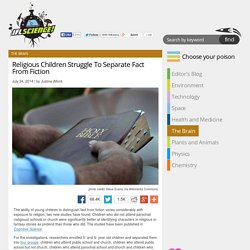
Children who did not attend parochial (religious) schools or church were significantly better at identifying characters in religious or fantasy stories as pretend than those who did. The studies have been published in Cognitive Science. For the investigations, researchers enrolled 5- and 6- year old children and separated them into four groups: children who attend public school and church, children who attend public school but not church, children who attend parochial school and church and children who attend parochial school but not church. They then exposed the children to three different types of stories- biblical (religious), fantastical (where the divine element was replaced with magic) or realistic (all supernatural elements removed). They then asked the children to judge whether the protagonist (lead character) was fictional or real.
Lots of atheists, more Muslims, fewer Christians and Jews: this is the new America. Drifting towards atheism: the Washington Post's overview map The Washington Post has produced six massively detailed maps showing the religious make-up of America.
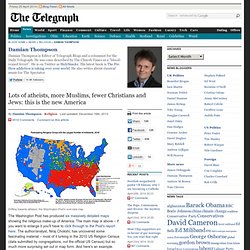
The main map is above – if you want to enlarge it you'll have to click through to the Post's report here. The author/analyst, Niraj Chokshi, has uncovered some fascinating material – most of it lurking in the 2010 US Religion Census (data submitted by congregations, not the official US Census) but so much more surprising set out in map form. And here's an example. Did you know there are – possibly – now more religious Muslims than religious Jews in Florida? We're in difficult territory here because the US census isn't allowed to ask people their religious affiliation. There are still more Jews than Muslims in Florida, loosely defined; these figures measure Judaism as a religion. Again, click through to the Washington Post for an interactive map. You think Protestantism is holding its ground?
Listen to our weekly podcast: Comparative religion. Comparative religion is the branch of the study of religions concerned with the systematic comparison of the doctrines and practices of the world's religions.
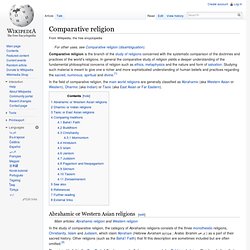
A surprising map of the world's most and least religiously diverse countries. The world's most and least religiously diverse countries may not be quite what you think, judging by an extensive report by Pew, from April 2014, that scores and ranks countries on religious diversity by indexing survey data with a mathematical model.
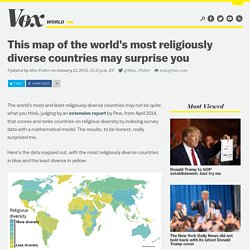
The results, to be honest, really surprised me. Here's the data mapped out, with the most religiously diverse countries in blue and the least diverse in yellow: Religious diversity by country, as measured by Pew's Religious Diversity Index. Click to enlarge. The three most religiously diverse countries all turn out to be in East Asia: Singapore, Taiwan, and Vietnam. U.S. Religion Map and Religious Populations - U.S. Religious Landscape Study - Pew Forum on Religion & Public Life. Jewish philosophy. Jewish philosophy (Hebrew: פילוסופיה יהודית; Arabic: الفلسفة اليهودية; Yiddish: ייִדיש פֿילאָסאָפֿיע) includes all philosophy carried out by Jews, or in relation to the religion of Judaism.
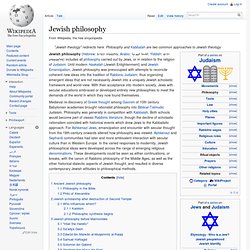
Until modern Haskalah (Jewish Enlightenment) and Jewish Emancipation, Jewish philosophy was preoccupied with attempts to reconcile coherent new ideas into the tradition of Rabbinic Judaism; thus organizing emergent ideas that are not necessarily Jewish into a uniquely Jewish scholastic framework and world-view. With their acceptance into modern society, Jews with secular educations embraced or developed entirely new philosophies to meet the demands of the world in which they now found themselves. Medieval re-discovery of Greek thought among Gaonim of 10th century Babylonian academies brought rationalist philosophy into Biblical-Talmudic Judaism. Philosophy was generally in competition with Kabbalah. Ancient Jewish philosophy[edit] Religion in the European Union. Religiosity in the European Union (2012)[1] Atheism (7%) Other/Don't know (3%)
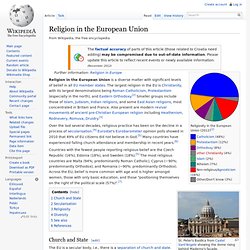
Men in frocks – God's curious fashion foibles. "No cutting your corners" says Yahweh "You shall not round the corners of your heads, neither shalt you mar the corners of your beard.
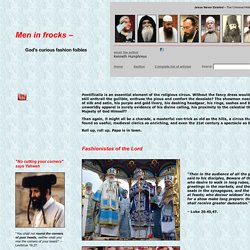
" – Leviticus 19.27. Tassels are in again this season "The Lord said to Moses, 'Speak to the people of Israel, and tell them to make tassels on the corners of their garments throughout their generations, and to put a cord of blue on the tassel of each corner. " – Numbers 15.38. "You shall make yourself tassels on the four corners of your garment with which you cover yourself.
" – Deuteronomy 22:12. Argumentation theory. Argumentation theory, or argumentation, is the interdisciplinary study of how conclusions can be reached through logical reasoning; that is, claims based, soundly or not, on premises.
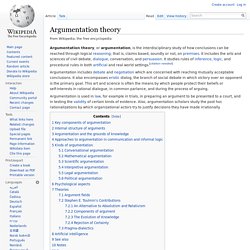
It includes the arts and sciences of civil debate, dialogue, conversation, and persuasion. It studies rules of inference, logic, and procedural rules in both artificial and real world settings. [citation needed] British faith today: open to the spirit, closed to religion. All sorts of claims about religious decline are flying around at the moment, from George Carey’s comment that the Church of England is “one generation away from extinction” to Richard Dawkins’ comments about religion being “more and more being left behind.”
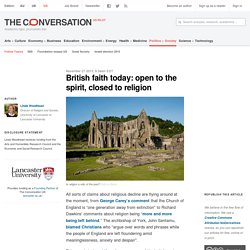
The archbishop of York, John Sentamu, blamed Christians who “argue over words and phrases while the people of England are left floundering amid meaninglessness, anxiety and despair". This year I designed three large surveys of the beliefs and values of adults living in Great Britain (excluding Northern Ireland), which were administered by YouGov. With large sample sizes and many questions about “religion” and “no religion”, they offer a richer portrait of the current state of affairs than existing surveys have been able to offer. Click to enlarge It’s common on surveys to ask people whether they are religious, spiritual, both or neither. My survey shows these “nones” are interestingly diverse. The moral minority.